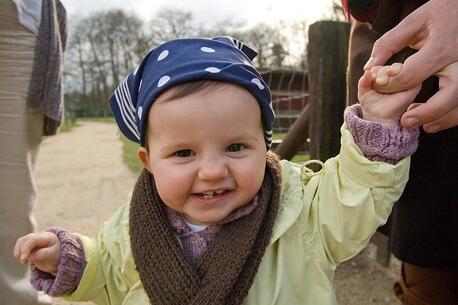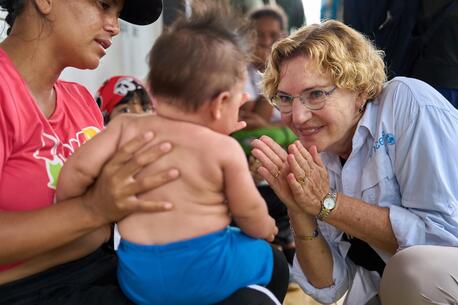
Parenting: Your 1-Year-Old's Developmental Milestones
All you need to know about your growing 1-year-old.
As your little one reaches the remarkable milestone of their first birthday, parenting takes on new dimensions. Understanding the developmental milestones of your 1-year-old is crucial for providing the best care and nurturing environment.
From first steps to expanded vocabulary, all your 1-year-old's milestones are cause for celebration. Here's a comprehensive guide to what to expect and parenting tips for helping your baby–turned–toddler at every step.
Understanding your 1-year-old's development
Babies undergo rapid growth and development during the first 12 months of life. They've transformed from fragile newborns into curious explorers eager to discover the world around them. Here are some critical areas of development and parenting tips for every step of the way:
Physical milestones
The physical leaps babies make in their first year are astounding. They go from newborns who cannot control their bodies to toddlers ready to take their first steps. At 12 months, babies may be:
- Pulling themselves up and holding onto the furniture or other stable objects.
- Moving from crawling to walking. A 1-year-old who walks while holding hands or taking a few steps on their own is right on track.
- Getting into a seated position without help.
Parent tips
Your 1-year-old needs a safe space to take on new physical challenges and become more sure on their feet. Ways parents can support their children's physical development include:
- Using activities like stacking blocks and playing with shape sorters to help them enhance hand-eye coordination.
- Getting active together — dance, join a tumbling class, go to the playground.
- Ensure your child gets a balanced diet and enough sleep. Both are essential to their growth and development.
Cognitive development of your 1-year-old baby
One-year-olds are like little sponges, absorbing information to make sense of their world. You will see them:
- Imitate gestures and sounds.
- Begin to solve simple problems.
- Locate an object when asked.
- Follow simple directions.
Parent tips
Stimulate your 1-year-old's cognitive growth and developing brain through play, interactive toys and activities they enjoy:
- Chat with your child as much and often as possible. Talk about what you do together and the day's routines. Ask them to identify objects to help expand their vocabulary and comprehension
- Encourage and respond to all your child's efforts to communicate. The sounds they make will eventually become words.
- Make reading a daily activity. Point out objects and characters, ask questions and encourage your child to participate.
- Sing songs and rhymes to help your child learn to have fun with language.
- Be patient and attentive. Give your child ample time to process and respond when you speak to them.
Food and nutrition
"How long should I keep breastfeeding?" is a common question. The answer is: It depends on the mother and child, but 12-month-olds who are still breastfeeding are on track.
Another answer to that question is that continuing breastfeeding has enormous benefits. The American Academy of Pediatrics recommends breastfeeding exclusively for the first six months, and the World Health Organization recommends continuing breastfeeding for the first two years. Breast milk provides good nutrition and bolsters children's immune systems, even after 12 months.
A 1-year-old still breastfeeding can also be eating solid foods and transitioning to a more varied diet. Most 1-year-olds still breastfeeding may also be drinking cow's milk and eating solid foods. Ever more discerning, they can also:
- Chew food thoroughly.
- Feed themselves.
- Understand that using a sippy cup without a lid is something to strive for.
- Enjoy a more varied array of foods. Finger foods, like soft-cooked vegetables and fruits, are vitamin-packed and allow toddlers to practice fine motor skills.
Parent tips
Good nutrition is essential to helping your child grow strong and take on new physical challenges. By one year, they should eat four to five meals a day, a half cup of food each, plus two healthy snacks. Meal times should be happy times you spend together. To encourage their developing taste buds:
- Give toddlers a variety of foods.
- Make a game of asking them to try new things.
- Allow your child to feed themselves during meals.
- Limit added sugars, salt and overly processed foods in favor of fruits, which are satisfyingly sweet and great for snacks.
- Keep them hydrated: Offer water throughout the day.
- "Picky eating" is expected at this age; be patient. Continue offering a variety of foods, and avoid pressuring or forcing your child to eat.
Your 1-year-old's language skills
Your 1-year-old may verbalize, making sounds we might call babble. But by now, you can probably pick out a few words. Toddlers communicate by:
- Gesturing and waving to express their emotions and needs.
- Saying "mama" and "dada" and easy-to-pronounce words.
- Responding to parents' simple requests.
Parent tips
Foster their language development by:
- Reading together.
- Engaging them in conversation.
- Encouraging them to learn and try out new words.
Social and emotional development
As your 1-year-old grows, they will become more aware of their surroundings and start forming attachments and expressing emotions. They may:
- Give you a book they want you to read.
- Experience separation anxiety.
- Feel shy around strangers.
- Help you dress them, putting arms through sleeves and stepping into pants.
- Repeat requests or sounds to ask for attention.
Parent tips
Encourage healthy social interactions by arranging playdates, modeling positive behavior and providing plenty of affection and reassurance. Other ways parents can help:
- Play games with them.
- Make requests that allow them to show off their new skills.
- Offer praise and affection to celebrate all the new things they can do.
Navigating challenges
Parenting a 1-year-old comes with its own set of challenges. From temper tantrums to sleep regressions, hurdles will crop up, so it's essential to approach them with patience and understanding. Establishing routines, setting boundaries and practicing consistent boundaries can help you navigate.
Parent tips
- Create a safe environment: Baby-proof your home to ensure an obstacle-free space for your little explorer to roam and play.
- Babies learn best by trying new things at their own speed. Follow their lead, and give them support and encouragement as they go.
- A consistent daily routine with set times for eating, sleeping, napping and playing helps your 1-year-old feel safe and secure. Even if they sometimes protest transitioning from one activity to another. Following a schedule helps the child feel secure and know what to expect. It also promotes healthy development and growth.
- Provide sensory experiences: Try hands-on activities like finger painting and sensory bins. Babies love cuddling soft-to-the-touch stuffed animals
- Spend time with friends: Plan playdates and go to music classes with other families to help with social skills. Time with other parents and friends also helps combat the feelings of isolation that sometimes crop up with the 24-7 job of parenting a new baby.
What to look out for
According to the CDC, milestones are things most children (75 percent) can do once they turn a certain age. While each baby develops at their own pace, consult your pediatrician if your 1-year-old:
- Isn't crawling.
- Doesn't engage in searching for hidden objects.
- Can't stand without assistance.
- Doesn't point out objects and people you ask them to identify.
- Doesn't have a vocabulary of a few simple words.
- Experiences regression in previously acquired skills.
A whole host of factors, some relatively benign, could be at play. So, if you are concerned, contact your pediatrician or healthcare provider. A professional opinion is the quickest path to peace of mind and interventions if needed.
Celebrating milestones
Every milestone your 1-year-old achieves is a cause for celebration. Whether it's their first steps, first word or first tooth, these triumphs are ones to cherish. Capture memories through photos and videos, create a milestone chart to track their progress and share your joy with friends and family.



